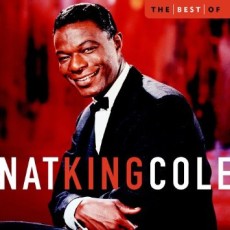
Daily Dose Of Jazz…
Nat King Cole was born Nathaniel Adams Coles on March 17, 1919 in Montgomery, Alabama, one of four brothers and a half sister. His brothers Ike and Freddy would follow in his footsteps and pursue careers in music. When he was four years old his family moved to Chicago, Illinois where his father became a Baptist minister and where the young lad learned to play the organ from his mother. His first performance was at age four and he began formal lessons at 12, eventually learning jazz, gospel and Western classical. He went to DuSable High School and studied in the music program under Walter Dyeth.
Sneaking out of the house and to hang around outside the clubs, he listening to artists such as Louis Armstrong, Jimmy Noone and Earl Hines, the latter who inspired him. Cole began his performing career in the mid-1930s while still a teenager, adopting the name Nat Cole. His older brother, Eddie, a bass player, joined Cole’s band playing clubs and made their first recording in 1936 under Eddie’s name. They also were regular performers at clubs. He got his nickname, “King”, presumably reinforced by the nursery rhyme “Old King Cole”.
Nat went on to be the pianist in the national tour of Shuffle Along revue about theatre legend Eubie Blake. When it closed in Long Beach, he decided to stay in California. He formed Cole and two other musicians formed the “King Cole Swingsters” that eventual became the King Cole Trio. Their first radio broadcast on NBC’s Blue Network in 1938 led to their Swing Soiree, the Old Gold, Chesterfield Supper Club, Kraft Music Hall and The Orson Welles Almanac.
Cole frequently sang in between instrumental numbers. Noticing that people started to request more vocal numbers, he obliged. There was a customer who requested a certain song one night, but it was a song that Cole did not know, so instead he sang “Sweet Lorraine”. The King Cole Trio signed with the fledgling Capitol Records, known as the “House That Nat Built” in 1943. Revenues from Cole’s record sales fueled much of the label’s success during this period including the construction of the circular building.
Nat would perform in the first Jazz At The Philharmonic, have his revolutionary lineup of piano, guitar, and bass was emulated by many musicians, among them Art Tatum, Oscar Peterson, Ahmad Jamal, Charles Brown and Ray Charles. He played with Lester Young, Red Callender and Lionel Hampton.
Cole’s first mainstream vocal hit was his 1943 recording of one of his compositions, “Straighten Up And Fly Right”, selling over 500,000 copies.
In 1946, the King Cole Trio Time program was on the air, recorded with a string orchestra and his pop stature came with his recording of “The Christmas Song” followed by a string of hits such as Nature Boy, Route 66, Mona Lisa, Too Young and Unforgettable. While this shift to pop music led some jazz critics and fans to accuse Cole of selling out, he never completely abandoned his jazz roots and in 1956 he recorded an all-jazz album After Midnight. He had one of his last major hits in 1963, two years before his death, with “Those Lazy-Hazy-Crazy Days of Summer”, which reached #6 on the Pop chart.
He would go on to have a variety show on NBC without national sponsorship despite appearances of Ella Fitzgerald, Harry Belafonte, Frankie Laine, Peggy Lee and Eartha Kitt. He would record Cole Espanol in Havana, Cuba, retool his final Nelson Riddle arranged album Wild Is Love into an Off-Broadway show titled “I’m With You”. Cole performed in many short films, sitcoms, and television shows such as St, Louis Blues, The Blue Gardenia, the Nat King Cole Story and on of his final appearances in Cat Ballou.
Cole was inducted into the Alabama Music Hall of Fame, the Alabama Jazz Hall Of Fame, the Down Beat Hall of Fame, the Hit Parade Hall of Fame, the Rock and Roll Hall of Fame, the Latin Songwriters Hall of Fame, a Grammy Lifetime Achievement Award, and has an official U.S. postage stamp in his honor.
Pianist, vocalist, composer and bandleader Nat King Cole, whose baritone voice performed in big band and jazz trio settings passed away on February 15, 1965 of lung cancer. He maintains worldwide popularity.


